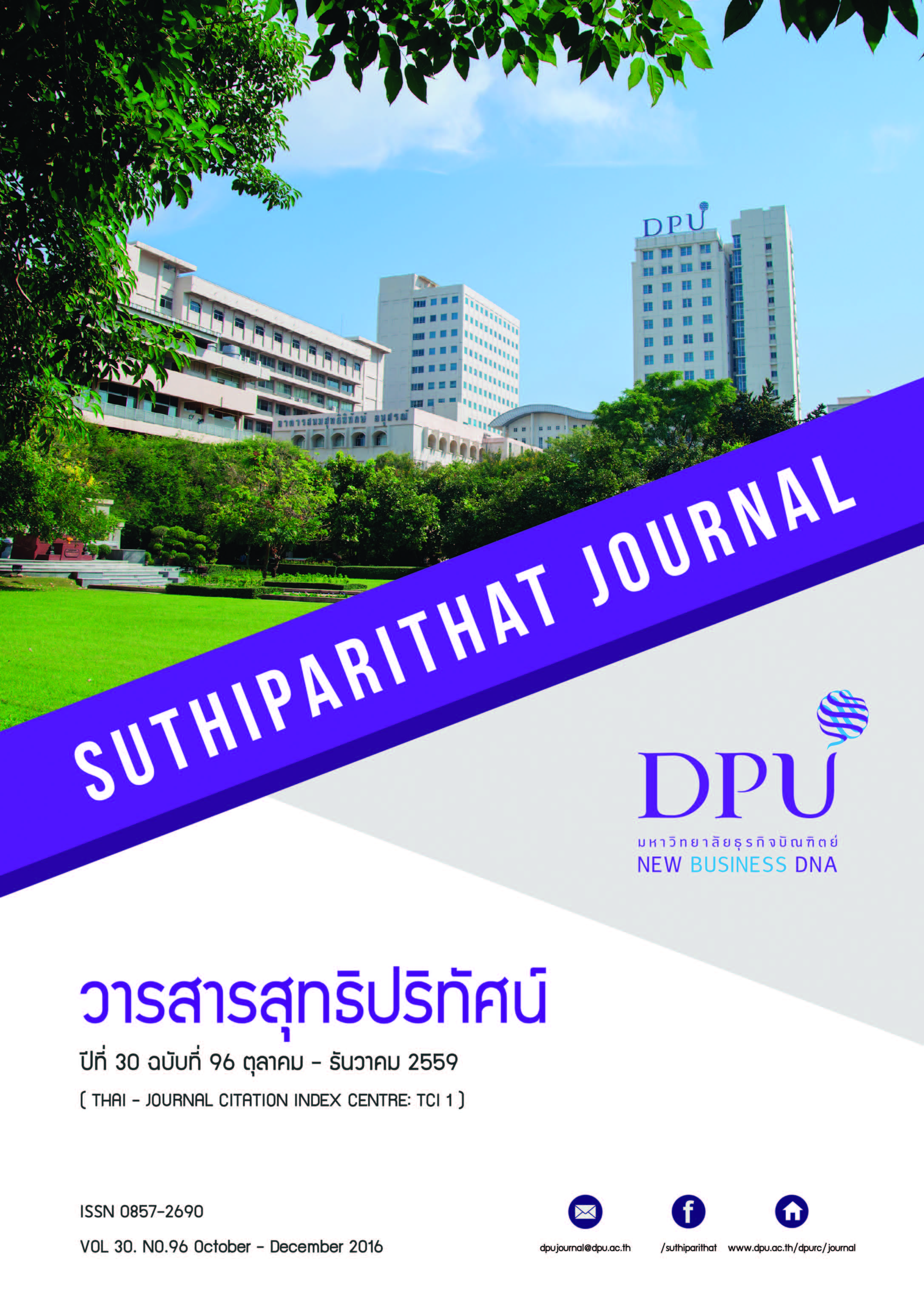ข้อควรพิจารณาในการให้ข้อมูลย้อนกลับเพื่อแก้ไขการเขียนในชั้นเรียนภาษาอังกฤษในฐานะภาษาต่างประเทศ
คำสำคัญ:
การเขียนภาษาอังกฤษในฐานะภาษาต่างประเทศ (EFL writing), การให้ข้อมูลย้อนกลับเพื่อ แก้ไขการเขียน (Written Corrective Feedback), การแก้ไขข้อผิดพลาด (Error Correction)บทคัดย่อ
ผู้สอนภาษาอังกฤษในฐานะภาษาต่างประเทศและผู้วิจัยด้านการสอนภาษาอังกฤษต่างเห็นความสำคัญของการให้ข้อมูลย้อนกลับเพื่อแก้ไขการเขียน ว่ามีประสิทธิภาพที่จะพัฒนาการเขียนของผู้เรียนภาษา บทความนี้ทบทวนรูปแบบต่างๆ ของการให้ข้อมูลย้อนกลับเพื่อแก้ไขการเขียน และศึกษาประสิทธิผลของการให้ข้อมูลย้อนกลับแต่ละรูปแบบต่อผู้เรียนในชั้นเรียนการเขียนตามที่พบในงานวิจัยด้านการสอนภาษาอังกฤษ รวมถึงประเด็นสำคัญที่ผู้สอนควรพิจารณา บทความนี้ได้ให้ข้อเสนอแนะบางประการแก่ผู้สอนภาษาอังกฤษในฐานะภาษาต่างประเทศ เพื่อนำรูปแบบการให้ข้อมูลย้อนกลับเพื่อแก้ไขการเขียนไปใช้ในชั้นเรียนการเขียนต่อไป
เอกสารอ้างอิง
Baleghizadeh, S. & Dadashi, M. (2011). The effect of direct and indirect corrective feedback on students’ spelling errors. PROFILE, 13(1), 129-137.
Baleghizadeh, S. & Gordani, Y. (2012). Academic writing and grammatical accuracy: The role of corrective feedback. Gist Education and Learning Research Journal, 6.
Beuningen, C. V. (2010). Corrective feedback in L2 writing: Theoretical perspectives, empirical insights, and future directions. International Journal of English Studies, 10(2), 1-27.
Bitchener, J. & Ferris, D. R. (2012). Written Corrective Feedback in Second Language Acquisition and Writing. New York, NY: Taylor and Francis.
Ellis, R. (2009). A typology of written corrective feedback types. ELT Journal Volume, 63(2), 97-107.
Farrokhi, F. & Sattarpour, S. (2012). The effects of direct written corrective feedback on improvement of grammatical accuracy of high-proficient L2 learners. World Journal of Education, 2(2), 49.
Fazilatfar, A., Fallah, N., Hamavandi, M. & Rostamian, M. (2014). The effect of unfocused written corrective feedback on syntactic and lexical complexity of L2 writing. Procedia - Social and Behavioral Sciences, 98, 482-488.
Guénette, D. (2012). The pedagogy of error correction: Surviving the corrective feedback challenge. TESL Canada Journal, 30, 117-126.
Ibarrola, A. L. (2013). Reformulation and Self-correction: Insights into correction strategies for EFL writing in a school context. Vigo International Journal of Applied Linguistics, 10, 29-49.
Jalaluddin, M. (2015). Role of direct and indirect corrective feedback in improvement of Hindi students’ writing skills. American International Journal of Research in Humanities, Arts and Social Sciences, 11(3) 159-162.
Kaweera, C. & Usaha, S. (2008). The impact of different types of teacher written feedback on EFL university students’ writing. KKU Res J (GS), 8(2), 83– 94.
Kozlova, I. (2010). Ellis’s corrective feedback in a problem-solving context. ELT Journal, 64(1), 95-97.
Lee, I. (2003). L2 writing teachers’ perspectives, practices and problems regarding error feedback. Assessing Writing, 8, 216–237.
Maleki, A. & Eslami, E. (2013). The effects of written corrective feedback techniques on EFL students’ control over grammatical construction of their written English. Theory and Practice in Language Studies, 3(7), 1250-1257.
Miao, Y., Richard, B. & Yu, Z. (2006). A comparative study of peer and teacher feedback in a Chinese EFL writing class. Journal of Second Language Writing, 15, 179-200.
Muncie, J. (2000). Using written teacher feedback in EFL composition classes. ELT Journal, 54(1), 47-53.
Puengpipattrakul, W. (2013). Assessment of Thai EFL undergraduates’ writing competence through integrated feedback. Journal of Institutional Research South East Asia, May/June, 11(1), 6-27.
Salteh M. A. & Sadeghi K, (2012). Teachers’ corrective feedback in L2 writing revisited: Concerns against and suggestions for its employment. World Applied Sciences Journal, 17(3), 375-383.
Sheen, Y. (2007). The effect of focused written corrective feedback and language aptitude on ESL learners’ acquisition of articles. TESOL Quarterly, 41(2), 255-283.
Sheen, Y., Wright, D. & Moldawa, A. (2009). Differential effects of focused and unfocused written correction on the accurate use of grammatical forms by adult ESL learners. System, 37(4), 556–569.
Soleimani, H. & Jamzivar, A. S. (2014). The impact of written peer corrective feedback on pre-intermediate Iranian EFL learners’ writing performance. IJLLALW, 5(4), 1-10.
Truscott, J. (2007). The effect of error correction on learners’ ability to write accurately. Journal of Second Language Writing, 16, 255-272.
Xu, J. (2009). Differential effects of two types of written corrective feedback (direct focused and direct unfocused) on the accurate use of grammatical forms by teenage EGL learners, Proceedings of The 16th conference of Pan-Pacific Association of Applied Linguistics (54-59).
Yoke et al., (2013). The use of online corrective feedback in academic writing by L1 Malay learners. English Language Teaching, 6(12), 175-180.
ดาวน์โหลด
เผยแพร่แล้ว
รูปแบบการอ้างอิง
ฉบับ
ประเภทบทความ
สัญญาอนุญาต
เนื้อหาและข้อมูลในบทความที่ลงตีพิมพ์ในวารสารสุทธิปริทัศน์ ถือเป็นข้อคิดเห็นและความรับผิดชอบของผู้เขียนบทความโดยตรงซึ่งกองบรรณาธิการวารสาร ไม่จำเป็นต้องเห็นด้วย หรือร่วมรับผิดชอบใด ๆ
บทความ ข้อมูล เนื้อหา รูปภาพ ฯลฯ ที่ได้รับการตีพิมพ์ในวารสารสุทธิปริทัศน์ ถือเป็นลิขสิทธิ์ของวารสารสุทธิปริทัศน์หากบุคคลหรือหน่วยงานใดต้องการนำทั้งหมดหรือส่วนหนึ่งส่วนใดไปเผยแพร่ต่อหรือเพื่อกระทำการใด ๆ จะต้องได้รับอนุญาตเป็นลายลักษณ์อักษรจากวารสารสุทธิปริทัศน์ก่อนเท่านั้น







